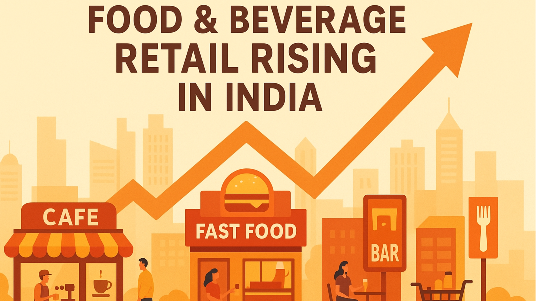High streets remain the dominant choice for operators, underscoring the sector’s appetite for prime locations beyond traditional mall formats.

F& B Retail
India’s food and beverage (F&B) sector has emerged as a key driver of retail real estate, clocking 4 million sq. ft of leasing across seven major cities since 2023, according to JLL. High streets remain the dominant choice for operators, underscoring the sector’s appetite for prime locations beyond traditional mall formats.
Bengaluru leads the charge, accounting for more than one-third of the total F&B leasing volume. Indiranagar continues to attract operators, while Mumbai and Delhi NCR follow as strong growth markets. Together, the three cities make up the bulk of the sector’s leasing activity, highlighting F&B’s growing role in India’s retail transformation. The momentum comes alongside 18.6 million sq. ft of new shopping mall space added in the past five years.
“The F&B sector is fundamentally reshaping India’s retail real estate landscape,” said Dr. Samantak Das, Chief Economist and Head of Research and REIS, India, JLL. “Developers are planning to dedicate up to 25% of space in upcoming destination malls to F&B. With 6 million sq. ft of dedicated F&B space expected by 2028, we anticipate rapid absorption in the next 3–5 years, driven by domestic and international operators. High streets, accounting for over 50% of F&B leasing in the past 30 months, continue to dominate transactions.”
The growth story is also attracting global players. Since 2023, more than 20 international F&B brands have entered India, led by US-based operators. Delhi NCR and Mumbai remain preferred entry points for global brands. Multi-cuisine formats dominate with a 41% share of leasing, reflecting India’s evolving consumer preferences shaped by global exposure.
High streets contributed 54% of gross F&B leasing across top cities. Their organic growth opportunities give them an edge over malls, especially in southern markets like Chennai and Hyderabad, and in Kolkata. Pune, however, reflects Delhi NCR’s mall-centric trend.
“India’s retail sector has shown remarkable resilience, with over 22 million sq. ft of leasing despite global headwinds,” said Rahul Arora, Head – Office Leasing & Retail Services, Senior Managing Director (Karnataka, Kerala), India, JLL. “Bengaluru not only dominates F&B absorption with a one-third market share but also leads the craft beverage revolution, with 40% of new pubs and breweries opening in Indiranagar. Mumbai and Delhi NCR complete the trinity driving two-thirds of national leasing activity.”
India’s organised retail stock now stands at 88.7 million sq. ft, led by Mumbai, Delhi NCR, and Bengaluru, which together hold 63% of assets. Between 2023 and H1 2025, retail leasing reached 22 million sq. ft, with malls accounting for 52% of activity. The sector has also seen significant institutional participation: about $ 2.5 billion has flowed in across 22 deals since 2018, while India’s first retail REIT, Nexus Select Trust debuted in 2023. Over 60 new global retailers have entered during this period, largely in Delhi NCR and Mumbai.
The retail pipeline through 2030 looks strong, with nearly 6 million sq. ft of upcoming space earmarked for F&B. Current trends suggest this will meet around 38–40% of F&B demand, while high streets are expected to absorb a larger share. Rising demand for amenity-driven retail in business parks also signals F&B’s integration with other retail formats.
With strong domestic consumption, steady global brand entries, and institutional confidence, JLL expects India’s F&B sector to remain a cornerstone of retail growth in the coming decade.
Empower your business. Get practical tips, market insights, and growth strategies delivered to your inbox
By continuing you agree to our Privacy Policy & Terms & Conditions
